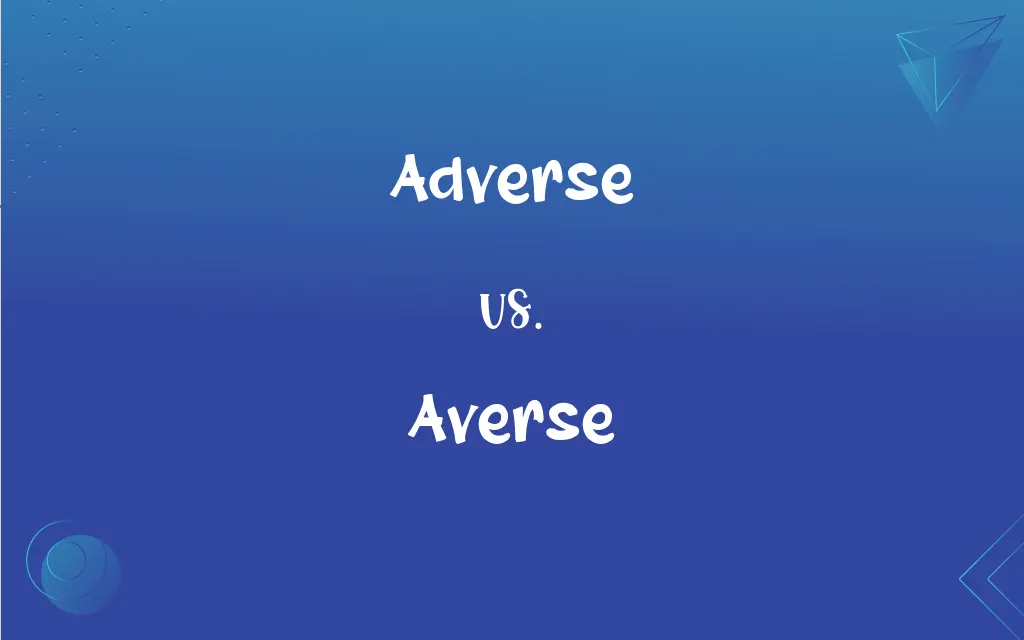Adverse vs. Averse: What's the Difference?
Edited by Aimie Carlson || By Janet White || Published on November 20, 2023
Adverse refers to unfavorable or harmful conditions or effects; Averse denotes a strong dislike or reluctance towards something.

Key Differences
Adverse and Averse, while sounding similar and sometimes confused in use, hold distinct meanings in the English language. Adverse typically refers to conditions, situations, or effects that are unfavorable or harmful. It can be used to describe events, conditions, or outcomes that are contrary to one's hopes or well-being. On the other hand, Averse is used to express a strong dislike or reluctance towards something, often describing personal feelings or inclinations.
In contexts like medicine or environmental studies, one might encounter the term 'adverse effects' or 'adverse conditions', suggesting detrimental or unfavorable outcomes. A drug might have adverse side effects, or a region might experience adverse weather conditions. Averse, in its contextual usage, is more personal. For instance, a person might be averse to trying spicy foods or averse to taking risks, indicating a personal disinclination or reluctance.
Adverse is often used to describe situations that pose challenges or create unfavorable circumstances. For instance, a company might face adverse market conditions that affect its profits. Averse, in contrast, typically follows with "to" and denotes a sentiment or disposition. Someone might be averse to change, suggesting a resistance or hesitation towards new situations or alterations.
A simple way to differentiate is to remember that adverse often relates to external circumstances that are detrimental, while averse pertains to internal feelings of dislike or reluctance. An adverse event doesn't necessarily mean people involved are averse to it, and someone being averse doesn't indicate the presence of an adverse situation.
Comparison Chart
Definition
Unfavorable or harmful.
Strong dislike or reluctance.
ADVERTISEMENT
Context
Situations, conditions, effects.
Personal feelings or inclinations.
Typical Usage
Adverse effects, adverse weather.
Averse to change, averse to risk.
Grammatical Follow-Up
Often stands alone.
Typically followed by "to".
Nature
Objective or external.
Subjective or internal.
Adverse and Averse Definitions
Adverse
Harmful or detrimental.
The drug has several adverse side effects.
ADVERTISEMENT
Averse
Disinclined or loath.
As a vegetarian, he is averse to eating meat.
Adverse
Unfavorable or negative.
The team faced adverse conditions during their expedition.
Averse
Having a strong dislike or opposition.
She is averse to spicy foods.
Adverse
Hostile or antagonistic.
They received adverse criticism for their performance.
Averse
Resistant or unwilling.
Many are averse to change in the workplace.
Adverse
Opposed to one's interests.
The company faced adverse market trends.
Averse
Opposed in feeling or sentiment.
The community was averse to the new policy.
Adverse
Contrary or opposing.
His decisions had an adverse impact on the project.
Averse
Feeling hesitation or reluctance.
He was averse to making a hasty decision.
Adverse
Acting or serving to oppose; antagonistic
Adverse criticism.
Averse
Having a feeling of opposition, distaste, or aversion; strongly disinclined
Investors who are averse to taking risks.
Adverse
Contrary to one's interests or welfare; harmful or unfavorable
Adverse circumstances.
Averse
Having a repugnance or opposition of mind.
Adverse
Moving in an opposite or opposing direction
Adverse currents.
Averse
Turned away or backward.
Adverse
Unfavorable; antagonistic in purpose or effect; hostile; actively opposing one's interests or wishes; contrary to one's welfare; acting against; working in an opposing direction.
Adverse criticism
Adverse weather
Averse
(obsolete) Lying on the opposite side (to or from).
Adverse
Opposed; contrary; opposing one's interests or desire.
Adverse circumstances
Averse
(heraldry) Aversant; of a hand: turned so as to show the back.
Adverse
(not comparable) Opposite; confronting.
The adverse page
The adverse party
Averse
To turn away.
Adverse
Acting against, or in a contrary direction; opposed; contrary; opposite; conflicting; as, adverse winds; an adverse party; a spirit adverse to distinctions of caste.
Averse
Turned away or backward.
The tracks averse a lying notice gave,And led the searcher backward from the cave.
Adverse
Opposite.
Averse
Having a repugnance or opposition of mind; disliking; disinclined; unwilling; reluctant.
Averse alike to flatter, or offend.
Men who were averse to the life of camps.
Pass by securely as men averse from war.
Adverse
In hostile opposition to; unfavorable; unpropitious; contrary to one's wishes; unfortunate; calamitous; afflictive; hurtful; as, adverse fates, adverse circumstances, things adverse.
Happy were it for us all if we bore prosperity as well and wisely as we endure an adverse fortune.
Averse
To turn away.
Adverse
To oppose; to resist.
Averse
(usually followed by `to') strongly opposed;
Antipathetic to new ideas
Averse to taking risks
Loath to go on such short notice
Clearly indisposed to grant their request
Adverse
Contrary to your interests or welfare;
Adverse circumstances
Made a place for themselves under the most untoward conditions
Adverse
In an opposing direction;
Adverse currents
A contrary wind
FAQs
Is "adverse" used to describe personal feelings?
No, "adverse" describes unfavorable conditions or effects, not personal feelings.
Can weather be described as averse?
No, weather can be "adverse," but not "averse."
Can "averse" be used without "to"?
Typically, "averse" is followed by "to" when indicating what one is disinclined towards.
Are adverse effects harmful?
Yes, "adverse effects" typically denote harmful or unfavorable outcomes.
Is adversity related to being averse?
No, "adversity" relates to "adverse" and means difficulties or unfavorable conditions.
Can adverse be used to describe feelings?
No, "adverse" describes conditions or effects, not feelings.
Can a situation be averse?
No, situations can be "adverse," but not "averse."
Can a decision have an averse outcome?
Decisions can have "adverse" outcomes, meaning unfavorable, not "averse."
Can a place be averse?
No, places can face "adverse" conditions, but they cannot be "averse."
Are the two terms interchangeable?
No, "adverse" and "averse" have distinct meanings and usages.
Is someone's aversion related to "adverse"?
No, "aversion" is related to "averse" and denotes a strong dislike.
Can a person be described as adverse?
Typically not. People are described as "averse to" something, not "adverse."
Can one be averse to positive events?
Yes, being "averse" is about personal dislike or reluctance, not the nature of the event.
Is adversity the same as aversion?
No, "adversity" relates to challenges, while "aversion" relates to strong dislike.
Do the two words originate from the same root?
Both come from Latin but have different roots and meanings.
Is a person who dislikes change adverse to it?
They are "averse to" change, not "adverse."
Can a policy be averse?
No, a policy can have "adverse" impacts, but cannot be "averse."
Can an outcome be averse?
Outcomes can be "adverse," meaning unfavorable, not "averse."
Is there an adjective form of averse?
"Averse" itself is an adjective.
Can a medication have averse effects?
A medication can have "adverse" effects, meaning harmful, not "averse."
About Author
Written by
Janet WhiteJanet White has been an esteemed writer and blogger for Difference Wiki. Holding a Master's degree in Science and Medical Journalism from the prestigious Boston University, she has consistently demonstrated her expertise and passion for her field. When she's not immersed in her work, Janet relishes her time exercising, delving into a good book, and cherishing moments with friends and family.
Edited by
Aimie CarlsonAimie Carlson, holding a master's degree in English literature, is a fervent English language enthusiast. She lends her writing talents to Difference Wiki, a prominent website that specializes in comparisons, offering readers insightful analyses that both captivate and inform.






































































